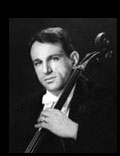Mission and Vision
For nearly five decades we have been dedicated to our mission of nurturing and championing the world’s finest young string players from around the world. We assist them with the development of professional and performance skills, provide them with performance opportunities and monetary support, and encourage their community involvement.
CMC also seeks to develop wider audiences for classical music in the San Francisco Bay area through the following activities:
- The Irving M. Klein International String Competition, a yearly competition which presents the world’s finest string players (ages 15-23) to local audiences.
- Collaborations with other musical organizations to produce concerts and recitals featuring young musicians.
- Outreach activities into schools and community centers to broaden the awareness of and access to great music.
- Commissioning new works in connection with its ongoing activities.
About Founder Irving M. Klein
 Virtuoso chamber musician, master cello teacher, and compassionate friend, Irving Klein served as the primary exemplar of his own conviction about musical education. He spent a lifetime in pursuit of excellence in musical performance, and he possessed a rare gift for discerning and supporting the highest motivations in others, so that wherever he lived he was continually at the growing center of a flourishing musical community.
Virtuoso chamber musician, master cello teacher, and compassionate friend, Irving Klein served as the primary exemplar of his own conviction about musical education. He spent a lifetime in pursuit of excellence in musical performance, and he possessed a rare gift for discerning and supporting the highest motivations in others, so that wherever he lived he was continually at the growing center of a flourishing musical community.
He was born in Cleveland, Ohio, the youngest of five children in a family of Hungarian-Polish Jewish descent that placed great value upon education in the arts, despite financial struggle. Fascinated by the cello, he showed exceptional talent for it at a very early age, and spent long hours absorbed either in practice or in playing chamber music with other young musicians, many of whom remained his lifelong friends.
After high school he was drawn to New York, arriving penniless except for a musical scholarship which was quickly exhausted. He became a student of the world-renowned cellist Emanuel Feuermann, who was so impressed by Irving’s ability and determination that he taught him without charge. Mr. Klein later continued that tradition, giving countless free lessons, often opening his home to talented students, and cutting costs wherever he could so that financial difficulties alone would not prevent a serious young musician from realizing his dream.
During those early years in New York, Irving distinguished himself as one of the most promising young cellists of his generation. He was chosen to tour with Leopold Stokowski in his All-American Youth Orchestra, and was soloist with and member of the Pittsburgh Symphony under the baton of Maestro Fritz Reiner. He interrupted his musical career during World War II by enlisting with the United States Army Air Corps because of his deep concern about the growing threat of the Hitler fascist regime. He spent three years as navigator of a B25 bomber and flew many combat missions over the China-Burma-India theater, for which he was awarded the Distinguished Flying Cross. He later remembered that he had felt paradoxically calm during those extremely dangerous flights and had believed at the time that, if his life were spared, he would never again be nervous before a musical performance.
After the war he returned to New York with his wife Elaine to complete his degree in Music at New York University, and to re-establish his career as a professional cellist. His musical accomplishments were many and varied, and the most important was his eighteen-year collaboration with violinist Marc Gottlieb in the Claremont Quartet. Acclaimed as one of the finest ensembles of that era, it recorded extensively on many labels and performed world-wide, often representing the United States Department of State in cultural exchange programs. At home, the Claremont held the distinction of presenting numerous recitals in the U.S. Library of Congress.
Irving Klein’s interest in teaching developed concurrently with his growth as a performing artist, and very soon he was sought after as a teacher and mentor by aspiring young professionals wherever his quartet was in residence. He gradually committed more of his energy to the training of young people and accepted the position of Professor of Cello and Chairman of the String Department at the newly founded North Carolina School of the Arts, where he also served as director of Chamber Music at the campus in Siena, Italy. During this period he took his entire cello class to Puerto Rico to perform for Pablo Casals as a “Symphony of Cellos.”
As Music Director of the California Music Center [for the past eleven years], he continued to train and inspire young people during each summer session, drawing additional faculty from among the finest teachers and performers of his wide acquaintance. He had hoped that the CMC would ultimately develop into a year-round school for gifted performers, and he worked constantly toward that end.
Irving Klein was a most compelling performer. Aspiring to be true to the intent of the composer, his artistry revealed that spiritual communication of the work which supersedes style, form, or technical display. To study cello with him was to embark on a highly individualized experience of both musical and personal discovery. He relished the unique qualities of each student, and he delighted in solving difficult technical problems. During lessons, hours slipped away like minutes while he patiently listened and advised.
Irving Klein dedicated his life to music and to humanity. It was his talent to create that very special atmosphere of inquiry, respect, and love that served to activate the creative efforts of his musical colleagues, students, and friends. He touched many lives gently and yet so profoundly that his spirit and example will shine on through them for generations to come.
–Anne Hershey
